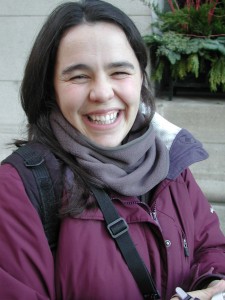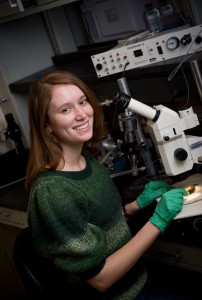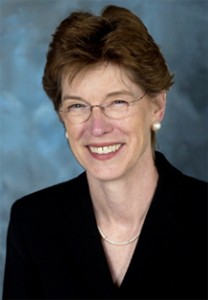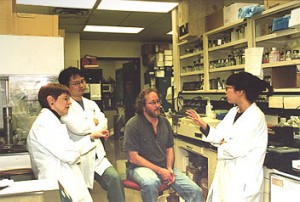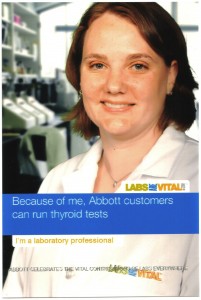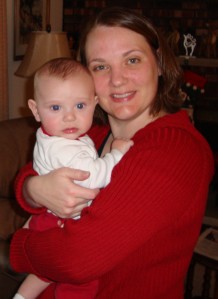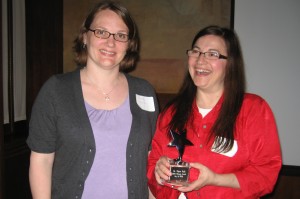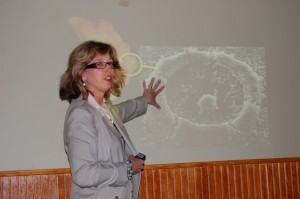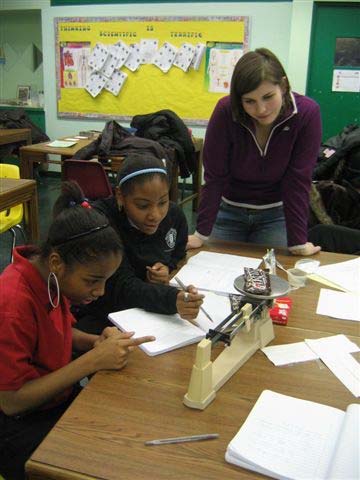June 2010 Scientist of the Month: Karen Visick, Ph.D.
by Michelle Merrigan
 Typically, passing around a bacterium and its host would not necessarily impress an audience. But to the delight of crowds, Dr. Karen Visick and members of her laboratory at Loyola University have livened up department research meetings and classes by bringing in specimens of glowing bacteria and tiny hatchling squid to pass around. Karen’s laboratory, in the Microbiology and Immunology Department at the Stritch School of Medicine, studies the fascinating symbiotic relationship between the marine bacterium Vibrio fischeri and the Hawaiian Bobtail Squid, Euprymna scolopes. V. fischeri cells are bioluminescent, and when grown to high density inside a particular organ in the squid, they emit light. This light keeps the squid from casting a shadow beneath it in the water column, which helps it avoid predators. When choosing her laboratory’s research focus, Karen was attracted to the V. fischeri-E. scolopes relationship because unlike many other bacteria-host model systems, the interaction was natural. Bacteria in the seawater associate with the squid without any manipulation.
Typically, passing around a bacterium and its host would not necessarily impress an audience. But to the delight of crowds, Dr. Karen Visick and members of her laboratory at Loyola University have livened up department research meetings and classes by bringing in specimens of glowing bacteria and tiny hatchling squid to pass around. Karen’s laboratory, in the Microbiology and Immunology Department at the Stritch School of Medicine, studies the fascinating symbiotic relationship between the marine bacterium Vibrio fischeri and the Hawaiian Bobtail Squid, Euprymna scolopes. V. fischeri cells are bioluminescent, and when grown to high density inside a particular organ in the squid, they emit light. This light keeps the squid from casting a shadow beneath it in the water column, which helps it avoid predators. When choosing her laboratory’s research focus, Karen was attracted to the V. fischeri-E. scolopes relationship because unlike many other bacteria-host model systems, the interaction was natural. Bacteria in the seawater associate with the squid without any manipulation.
Karen earned her Ph.D. at the University of Washington studying gene regulation, in particular flagellar assembly in Salmonella. Karen has been a professor at Loyola for 12 years and is taking her first sabbatical this coming fall. During her sabbatical, she will be studying pathogenic members of the Vibrio genus with Dr. Jorge Crosa at Oregon Health and Science University in Portland, Oregon. . She hopes to learn more about biochemical approaches to studying pathogenesis and share the genetic manipulation tools she has developed with her colleagues.
Karen’s husband, Dr. Jonathan Visick, is also a microbiologist and teaches at North Central College in Naperville. They have been fortunate enough to manage joint sabbaticals in Portland. Jon was offered a faculty development position at Lewis and Clark University and Karen was then able to arrange her own sabbatical. Their nine year-old daughter, Rachel, is also excited to live in a new city for a few months.
Karen expertly balances the many duties of an Associate Professor, including research and teaching, and spending time with her family. She credits her husband’s flexibility and willingness to share childcare duties as part of her ability to meet the demands of academic life. Karen says that while the notion of quality time may have become a cliché, it has been key to managing being a professor and a mother. For example, she sets aside Monday as the day of the week when she leaves the lab early and has a special Mother-Daughter night with Rachel.
Karen is also the director of the Microbiology and Immunology Department’s Graduate Program, which involves managing the needs of current students. She enjoys this position and has no desire to pass it on to another faculty member, even after 6 years. As a student in the department, I can personally attest to her skill in and dedication to this time-consuming job, which has definitely made a positive impact on students.
Nomination and article submitted by AWIS Chicago Staff Writer Michelle Merrigan. Ms. Merrigan is a PhD candidate in the Microbiology and Immunology Department at Loyola University Chicago’s Stritch School of Medicine. Her research focuses on the pathogenesis of the bacterium Clostridium difficile. After graduation, she hopes to pursue a career in scientific writing or communications.
*Know a scientist you think should be featured in an upcoming “Scientist of the Month” article? Send nominations to Jessica Reimer. Your nominee does not need to be an AWIS member or a woman, but should promote the advancement of women in science, technology, mathematics and engineering.
Want to keep yourself up-to-date on AWIS Chicago activities? Follow AWIS Chicago on Twitter! You can request to be added to our listserve by clicking here, and join the AWIS Chicago group on LinkedIn and Facebook by clicking the icons on the bottom right of this page.

